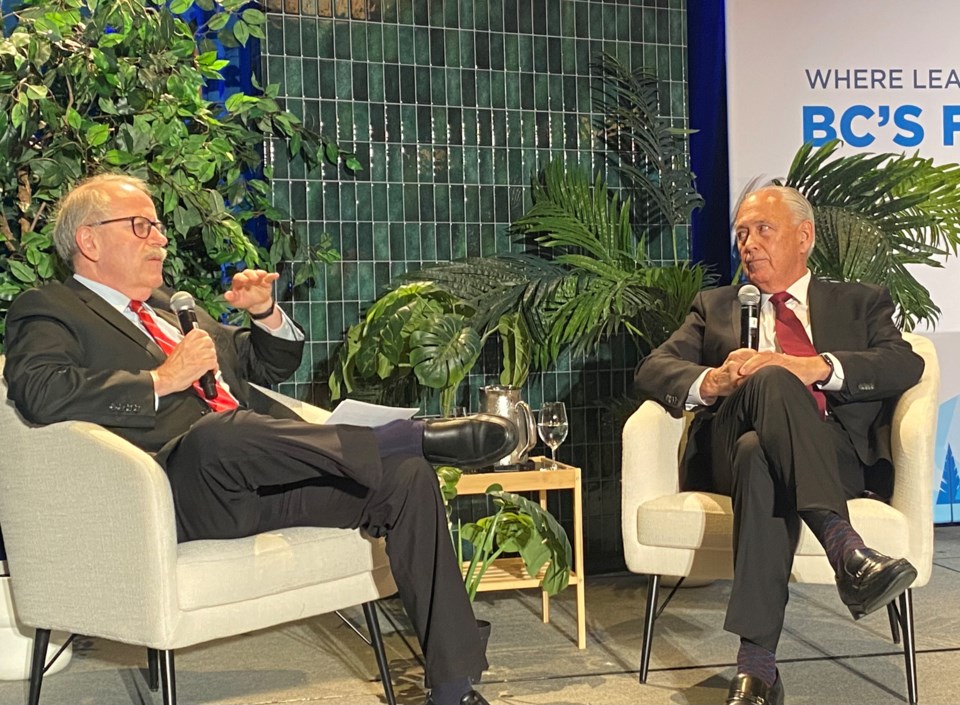The B.C. NDP government has made some significant policy changes on everything from indigenous reconciliation and forestry to climate change.
But it should pump the brakes on land use changes that create uncertainty for business and investors, former B.C. NDP premier Glen Clark said Monday at the Business Council of BC’s annual Business Summit.
“Stop making changes,” Clark said. “Let business catch up. We need a period – a lengthy period -- of stability.”
Clark was one of two former B.C. premiers sharing both a stage and a last name at today’s summit. Former Liberal premier Christy Clark also spoke at the summit.
After leaving politics, Glen Clark went to work for Jim Pattison, serving as president and COO of the Pattison Group, which owns a large share of Canfor Corp. (TSX:CFP). Clark, who retired from the Pattison Group in 2022, has seen the workings of the B.C. economy from the perspective of both government and the private sector.
He said B.C. and Canada are facing some major challenges to its economy, including per capita GDP decline, stagnant productivity growth, rising government deficits, a housing crisis, a strained health care system, First Nations reconciliation challenges, a widening income inequality gap and an opioid crisis.
“The provincial government is clearly responding to some of those problems,” Clark said. “Whether one agrees or not with their approach to housing or health care or reconciliation…no one can say they aren’t taking action.”
However, he said some of that government action is creating great uncertainty for business.
“Too many of the policy actions are at odds with each other: Mass timber promotion on the one hand, while the core primary forest industry is in crisis. Large grants for incremental clean energy to companies that are struggling to survive in their main business. Overdue First Nations reconciliation policy moves that create new uncertainty for existing businesses.”
Clark said the B.C. forestry sector in particular is in trouble.
“The industry is literally a shadow of its former self,” he said.
“In recent years, the provincial government has made literally dozens of changes to the rules governing forestry and land use,” he said. “While each change, in and of itself, may be justified and each change may indeed be modest, the cumulative impact on industry operating on the land has been devastating.
“Today, the B.C. forest industry is in crisis. Sawmills have closed and more are closing. Harvest levels are down to that which we saw in the 1960s. Pulp mills are unprofitable."
Last year, B.C. harvested only 60 per cent of the annual allowable cut, Clark said.
“Even when fibre is available, industry does not have access to it.”
On climate change policies, federally and provincial, Clark suggested there needs to be some balance that recognizes the importance of Canada’s energy and resource sectors.
“It would really make sense for British Columbia and for Canada to really back up a second and look at where we’re at in the world,” he said.
“We need to exploit our natural resources. That is our competitive advantage. That shouldn’t necessarily preclude significant moves on climate change. It’s just that you can’t just do one and not think about the other.”
On Indigenous rights and title, Clark said government policies in recent years have created uncertainty for business. He suggested reconciliation might be better addressed through royalty and stumpage revenue sharing with First Nations than by reforms to land ownership and management.
“We need to make First Nations true partners in economic opportunity,” Clark said. “The way to do that is not, as a first step, to move to land co-management. Rather the first step must be revenue sharing.”
“The government, as a precursor to co-management, needs to ensure some of the wealth generated by the land is returned to indigenous people. Only then will we see a commonality of interests – a true partnership – with the private sector.”
Nationally, Canada is dealing with low productivity and stagnating wages. Clark said high immigration was part of the problem.
“In my judgment, (there is) too much immigration right now in Canada, which is keeping wages low, which business always thinks is good for them. But ultimately it leads to a replacement of capital and labour. It leads to lower wages overall, and therefore a more stagnant, less dynamic economy.”



